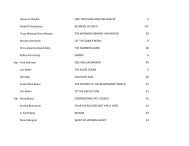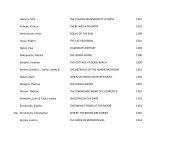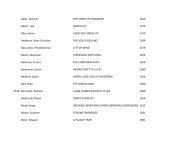nonfiction
nonfiction
nonfiction
Create successful ePaper yourself
Turn your PDF publications into a flip-book with our unique Google optimized e-Paper software.
“A refined jeremiad sure to<br />
shake up the Christian establishment.”<br />
from bad religion<br />
While Putin carefully maintains stability and order to keep his<br />
grip, Hugo Chávez of Venezuela cultivates popular chaos, stacking<br />
all government institutions with supporters so that he has<br />
amassed “unchecked executive power.” Besides speaking with<br />
plenty of brainwashed supporters of these regimes, Dobson<br />
sought out activists in the political opposition who have bravely<br />
endured terror and intimidation.<br />
A pertinent work of journalistic research that will gain<br />
fresh meaning as authoritarian regimes both evolve and fall.<br />
RON PAUL’S REVOLUTION<br />
The Man and the<br />
Movement He Inspired<br />
Doherty, Brian<br />
Broadside Books/<br />
HarperCollins (272 pp.)<br />
$26.99 | May 15, 2012<br />
978-0-06-211479-2<br />
A breezy and generally admiring<br />
though not hagiographic look at the<br />
quixotic fixture at the far-right extreme<br />
of the last couple of presidential elections.<br />
Reason editor Doherty (Gun Control on Trial: Inside the Supreme<br />
Court Battle Over the Second Amendment, 2009, etc.) would seem<br />
to share Ron Paul’s libertarian leanings, though he professes<br />
some amusement and bewilderment at Paul’s tactics, if not his<br />
message. Paul, for instance, has often spoken of terrorist activities<br />
as the blowback attendant in our messing around in other<br />
countries’ business, to which Doherty responds, presumably<br />
channeling Joe Six-Pack, “Whoa—a history lesson, recognizing<br />
consequences to our actions, an empathetic approach to what<br />
the rest of the world would think” The rhetorical trick gets a<br />
little old, but it’s clear that Doherty cares greatly about capturing<br />
what Paul’s supporters think about him and his ideas and,<br />
moreover, that he cares about representing them fairly. Much of<br />
the narrative is thus given over to fan notes, as against the words<br />
of the supposedly elite media. Not that the fan base is huge to<br />
begin with: “Paul’s rigorous hewing to a vision of government<br />
that almost every part of America’s learned political, academic,<br />
and media elites considers silly was only the start of his problems<br />
with the American electorate.” Doherty offers considerable<br />
insight into some aspects of Paul’s ongoing presidential<br />
campaigns. The chances of his ever being elected, after all, are<br />
vanishingly small, but one desired effect might be the opportunity<br />
to influence the choice of vice president, as he might have in<br />
2008. Yet Paul, a maverick if nothing else, keeps his own counsel,<br />
insisting, for instance, on giving lessons in Austrian economic<br />
theory and demanding the abolition of the Federal Reserve<br />
rather than sharpening crowd-pleasing attacks on America’s foreign<br />
wars and the ill-advised war on drugs at home.<br />
Illuminating, if sometimes a chore to read, and a welcome<br />
aid to understanding the evolution of Paul’s offbeat<br />
ideas.<br />
THE BLOOD OF HEROES<br />
The 13-Day Struggle for the<br />
Alamo—and the Sacrifice<br />
that Forged a Nation<br />
Donovan, James<br />
Little, Brown (544 pp.)<br />
$29.99 | May 15, 2012<br />
978-0-316-05374-7<br />
A popular historian revisits the most<br />
stirring siege in American history.<br />
On Feb. 24, 1836, vastly outnumbered<br />
and defending an old Spanish mission in San Antonio against<br />
Santa Anna’s Mexican army, garrison commander William Barret<br />
Travis issued a plea for reinforcements. To the people of<br />
Texas and “all Americans in the world,” he declared, “I shall<br />
never surrender or retreat.” He did neither, and the slaughter<br />
of the Alamo’s defenders has reverberated ever since. Donovan<br />
(A Terrible Glory: Custer and the Little Big Horn—The Last Great<br />
Battle of the American West, 2008, etc.) rightly deems the Battle<br />
of the Alamo the signal event of the Texas struggle for independence.<br />
The two-week siege bought precious time for the fledgling<br />
provincial government to organize, for settlers to recognize<br />
the immediacy of their peril and for Sam Houston’s Army of<br />
the People to assemble and train. The siege bogged down Santa<br />
Anna’s avenging force, killing many of his best troops. When,<br />
seven weeks later, Houston’s army surprised and routed the<br />
Napoleon of the West’s exhausted soldiers at San Jacinto, the<br />
Texans’ battle cry was “Remember the Alamo!” Donovan’s<br />
thoroughly researched and agreeably told story focuses on the<br />
13-day standoff, but he also supplies crucial context, helping us<br />
to understand the history of the breakaway province and notable<br />
characters in the revolution like Houston, Stephen Austin,<br />
Ben Milam and James C. Neill. He explains how the principal<br />
actors in the Alamo drama—including, of course, former congressman<br />
and frontiersman David Crockett and knife-fighter<br />
James Bowie—arrived at this juncture in history. Yes, the Alamo<br />
is remembered, but not without controversy. What really happened<br />
inside those battered walls Did Travis really draw a line<br />
in the sand, asking all who would stand with him to step across<br />
it Without breaking the flow of his compelling story, Donovan<br />
reliably separates fact from legend, persuasively assessing the<br />
evidence and artfully setting the scene.<br />
An authoritative, moving retelling of an enduring episode<br />
of sacrifice and courage. (Author tour to Dallas, Houston,<br />
Austin, San Antonio, Killeen)<br />
BAD RELIGION<br />
How We Became<br />
a Nation of Heretics<br />
Douthat, Ross<br />
Free Press (336 pp.)<br />
$26.00 | Apr. 17, 2012<br />
978-1-4391-7830-0<br />
A piercing critique of heresy in a<br />
country where “traditional Christian<br />
teachings have been warped into justifications<br />
for solipsism and anti-intellectualism,<br />
jingoism and utopianism, selfishness and greed.”<br />
New York Times columnist and National Review film critic<br />
Douthat (Privilege: Harvard and the Education of the Ruling<br />
Class, 2005, etc.), a practicing Catholic, takes aim at the forces,<br />
on both the left and the right, that are corrupting American<br />
Christianity from within. From its glory days after World War<br />
II, when preachers were respected as legitimate moral arbiters<br />
and theologians had huge followings, Christianity has fallen on<br />
hard times. The traditional pillars of American religion—the<br />
once-omnipresent Protestant mainline exemplified by Reinhold<br />
Niebuhr, the nuanced and self-confident Catholicism of<br />
Archbishop Fulton Sheen, the evangelical revival led by Billy<br />
Graham and the beleaguered but transcendent black church of<br />
Martin Luther King Jr.—have all ceded their place in the public<br />
imagination, writes the author, as hundreds of dubious upstart<br />
doctrines claim converts in droves. The mushy universalism<br />
embraced by Protestant churches has caused believers to lose<br />
interest, the Catholic Church has been riven by dissension and<br />
scandal and the evangelical and historically black churches have<br />
given way to the creepy prosperity gospel of Joel Osteen, Creflo<br />
Dollar and others. While some of the particulars of Douthat’s<br />
arguments will be controversial—e.g., his portrayal of the academics<br />
involved in the Jesus Seminar as being as unconcerned<br />
with the facts as are fabulists like Dan Brown—his full-throated<br />
defense of Christian orthodoxy deserves to be heard in an age<br />
when theology, if not spirituality, has become something of a<br />
niche interest. For Douthat, the beauty of Christianity lies in<br />
the “paradoxical character” of Jesus, who “sets impossible standards<br />
and then forgives the worst of sinners.” When churches<br />
focus on only one aspect of Jesus’ nature and profess to offer<br />
easy answers to all of life’s problems, he writes, they hold up a<br />
false idol for worship.<br />
A refined jeremiad sure to shake up the Christian<br />
establishment.<br />
GODFORSAKEN<br />
Bad Things Happen.<br />
Is There a God Who Cares<br />
Yes. Here’s Proof.<br />
D’Souza, Dinesh<br />
Tyndale House (290 pp.)<br />
$24.99 | Feb. 17, 2012<br />
978-1-4143-2485-2<br />
Conservative writer and speaker<br />
D’Souza (The Roots of Obama’s Rage, 2010,<br />
etc.) draws on years of experience publicly<br />
debating atheists in crafting a new argument for the existence, and<br />
benevolence, of God.<br />
Though widely sympathetic to the reasons that most atheists<br />
and agnostics have decided against faith, the author argues<br />
that too often belief against the existence of God stems primarily<br />
from a disappointment with God, which is then rationalized<br />
into unbelief. Therefore, a defense of God’s existence cannot be<br />
divorced from a sound theodicy, an explanation of why God allows<br />
814 | 15 april 2012 | <strong>nonfiction</strong> | kirkusreviews.com |<br />
| kirkusreviews.com | <strong>nonfiction</strong> | 15 april 2012 | 815






